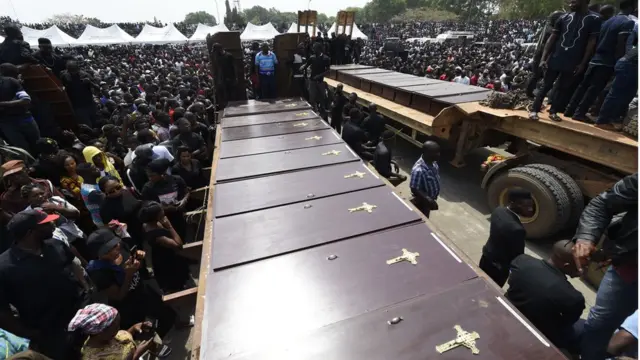Benue State, once known as the "Food Basket of the Nation," is now recognized for a more tragic reality—one of bloodshed, displacement, and political controversy. In 2025, the region is reeling from some of the deadliest mass killings in Nigeria's recent history, with little sign of resolution. These violent attacks, blamed largely on armed herdsmen and bandits, have not only shattered communities but also exposed deep fault lines between local and federal authorities.
This blog post delves deep into the Benue killings, their political implications, community reactions, and the role of Nigerian media, including notable platforms like Sahara Reporters.
Where Is Benue State?
Benue State is located in Nigeria’s North Central region and is bordered by Nasarawa, Taraba, and Enugu states. It’s rich in farmland, river systems, and cultural diversity, home to the Tiv and Idoma people.
Historically, it has been at the center of Nigeria’s farmer-herder conflict—a long-running struggle over land, grazing routes, and ethnic division.
Recent Killings: A Timeline of Horror

🔥 June 14, 2025 – Yelewata Massacre
In one of the most brutal attacks yet, armed gunmen stormed Yelewata, a rural community in Guma Local Government Area, setting homes ablaze and killing over 100 people—many burned alive in their homes.
“They killed everyone they saw, even children. They locked people in houses and set them on fire,” said a local survivor.
⚰️ Early June – Gwer West and Apa LGAs Attacked
At least 20 more people were killed in two separate but coordinated attacks in Apa and Gwer West LGAs. Police confirmed 12 deaths in Apa and 10 in Gwer West. Survivors claimed the death toll was higher, as several families were missing loved ones.
🕯️ Late May – Aondona Village Attacked
In Aondona, also in Gwer West, 20 more civilians were killed. Eyewitnesses described the attackers as well-armed and moving in large numbers. Survivors fled into nearby forests.
Who Is Behind the Attacks?
The Nigerian Police and local sources often blame “unknown gunmen”, but Fulani herdsmen militias and criminal bandits are frequently mentioned. Their motivations range from retaliation to territorial conquest and control of agricultural lands.
This violence ties into Nigeria’s broader herder-farmer conflict, a deadly land dispute worsened by desertification, poverty, and state neglect.
Learn more about the Fulani conflict.
The Politics of Benue: Alia vs Ortom
Governor Hyacinth Alia
Hyacinth Alia, a Catholic priest-turned-politician, became the Governor of Benue State in 2023 under the All Progressives Congress (APC). His government has condemned the attacks, deployed humanitarian teams, and promised improved security.
Yet, critics argue he has not been transparent.
Former Governor Samuel Ortom
Samuel Ortom, who served from 2015 to 2023, remains an outspoken voice. He accused Alia of “concealing mass burials” and failing to defend citizens.
Ortom was known for the Anti-Open Grazing Law of 2017, which banned herders from moving cattle across farmlands. His approach made him a target of armed groups—but won him praise from farmers.
National Leaders React – Tinubu’s Silence?
Many Nigerians have criticized President Bola Tinubu for failing to visit or directly comment on the Benue killings. In contrast, the Nigerian Senate condemned the violence and demanded immediate intervention.
Senator Titus Zam, representing Benue North-West, led calls for:
-
Deployment of more security forces
-
Arrest of known militia leaders
-
Compensation for displaced persons
Civil Unrest in Gwer West
In March 2025, following the killing of a local vigilante commander, angry youths in Naka, the Gwer West headquarters, set fire to:
-
The Local Government Secretariat
-
The palace of the local traditional ruler
-
The guest house of Senator Titus Zam
This act of defiance shows the frustration of ordinary people who feel abandoned by the government.
Impunity and Inaction
Groups like the Save Peace and Democracy Foundation (SAPEDEF) have demanded that the government:
-
Arrest militia leaders known as “Matthew,” “Chen,” and “Overall Konyo”
-
Freeze their funding sources
-
Investigate state collaborators
These names allegedly lead killer gangs terrorizing Benue, yet no visible action has been taken.
Benue’s Agricultural Collapse
Known as the “Food Basket of the Nation”, Benue’s economy depends heavily on farming.
A recent study from the University of Agriculture Makurdi revealed that:
Every 1% rise in insecurity leads to a 0.3% drop in crop and livestock production.
Food prices are soaring. Farmers are abandoning fertile lands. Markets are shrinking. Benue’s economy is hemorrhaging.
Role of Media & Sahara Reporters
Prominent Nigerian outlets like:
...have played a key role in reporting the ongoing crisis.
Sahara Reporters, in particular, has maintained its stance on accountability journalism, exposing:
-
Government silence
-
Failures in policing
-
Eyewitness testimonies ignored by mainstream media
Their investigative stories are often picked up by international outlets like AP News.
Displacement & Humanitarian Crisis
According to the Internal Displacement Monitoring Centre (IDMC), Benue State currently hosts over 1 million Internally Displaced Persons (IDPs)—many living in:
-
Makeshift camps
-
School buildings
-
Churches and mosques
Access to water, healthcare, and food is severely limited.
What Can Be Done?
Policy Recommendations:
-
Federal intervention through special military operations
-
Justice for victims via mobile courts and mass burial investigations
-
Implementation of grazing reserves with enforcement mechanisms
-
Relief funding for farmers and traders affected
-
Digital surveillance & drones to monitor hotspots
Civil Society Actions:
-
Petition campaigns
-
Human rights advocacy
-
Support for displaced families
-
Documentation and legal aid
Final Thoughts
Benue State stands at a dangerous crossroads. The killings are not just random acts of violence—they are symptoms of a failed security system, broken political promises, and historical neglect.
The people of Benue deserve better: better protection, better leadership, and better justice.
Until that happens, the “Food Basket” risks becoming a forgotten battlefield, where survival replaces harvest, and silence replaces justice.

You must be logged in to post a comment.